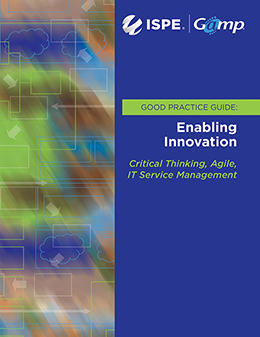GAMP Good Practice Guide: Enabling Innovation

Published: September 2021
Pages: 102
The drive within life sciences to improve patient safety and product quality, and provide value to society, while reducing costs requires constant and effective innovation. However, because the pharmaceutical industry operates in a highly regulated sector, some practitioners may apply unthinking, prescriptive, and rigid approaches that are not commensurate to the needs of the process, the nature of the system, and the real risk to the product and the patient.
The US FDA CDRH (Center for Devices and Radiological Health) Case for Quality program identified that an excessive focus on compliance rather than quality may divert resources and management attention toward meeting regulatory compliance requirements rather than adopting best quality practices. This may also deter investment in automation and digital technologies that could assist in quality improvements and process control.
The ISPE GAMP® Good Practice Guide: Enabling Innovation – Critical Thinking, Agile, IT Service Management provides information to support the adoption of new and improved approaches to software engineering, data management, and “as a Service” offerings (XaaS), including the use of supporting tools. This helps regulated companies facilitate the best use of resources and encourages the application of appropriate and proportionate practices.
This GAMP® Good Practice Guide discusses how critical thinking based on product and process knowledge and quality risk management can enable the removal of barriers to the introduction of new and innovative technologies. Practical considerations are presented, such as ways to increase the maturity level of an organization’s critical thinking ability, the appropriate use of requirements management and traceability tools to eliminate duplicating documentation as audit evidence, and the use of scripted and unscripted testing for maximum effectiveness.
A large percentage of organizations developing software use Agile methods, and the ability for regulated companies to leverage these techniques in the GxP environment is essential to encourage innovation. ISPE GAMP® 5 supports the use of incremental, iterative, and evolutionary approaches, including Agile, for product development and development of custom applications. The ISPE GAMP® Good Practice Guide: Enabling Innovation – Critical Thinking, Agile, IT Service Management illustrates how Agile software methodology can be implemented in a way that is completely aligned with GxP.
Systems hosted in the cloud are increasingly used to support GxP processes, and regulated companies need to understand the quality and compliance implications in order to deal with them effectively and efficiently. Regulated companies cannot delegate their regulatory accountabilities to an IT/IS service provider; however, they may leverage the knowledge, experience, activities, and artifacts of an IT/IS service provider through risk-based assessment, management, and governance processes. A discussion of good practices in these areas is provided in this Guide, including examples of where information security standards/industry guidance are aligned with GxP requirements.
The guide shows the benefits offered by adopting innovative practices combined with the experience and knowledge of the Subject Matter Experts (SMEs) to identify how best to realize the opportunities to provide process, services (and products) that are fit for their intended use and can be efficiently maintained in a state of control.
Guide Core Team
For the full list of contributors to this Guide see https://ispe.org/publications/guidance-documents/teams








